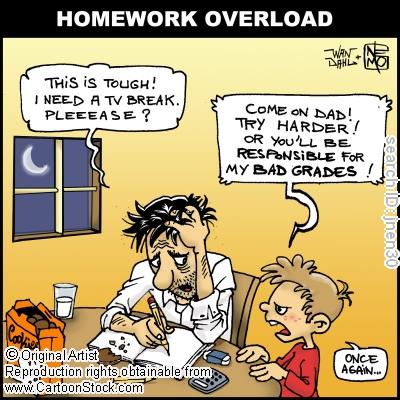Parents, Stop Doing your Child's Homework!

While we were having coffee together, my boyfriend shared a few details about a morning radio show he recently heard. A woman called in to boast about doing homework for her son. In fact, she admitted to writing a full paper for him, and then having to scale it down some to match his level of writing. As a teacher I immediately had something to say about this common practice. However, I waited patiently for my boyfriend to finish the story. He continued explaining that the hosts, at least one of them, praised her for doing the boy’s homework. He called her a wonderful mother who is doing exactly what a mother should do. A second host interjected that doing her child’s homework may not be such a good idea. But she was not heard. I then began to share my opinion, of which my boyfriend was already very much aware.
PARENTS, STOP DOING YOUR CHILD'S HOMEWORK!
The sad reality is that too many parents are doing their child’s homework. This practice is more common at the primary grade levels, (K-5), but make no mistake that even in junior high and high school, the problem persists. There are different reasons for why parents are doing their child’s homework, a topic that may require another blog. However, to wet your appetite just a bit, with the way our grading system works, and with how competitive our university system is in the United States, the grade earned has become the end-all-be-all while mastery of content is left by the wayside. If you are interested in learning more about this, please stay tuned.
The Consequences to the Child
Make no mistake about it, there are certain consequences when parents and/or older siblings do homework for the child, especially as the child progresses through junior high and high school. It is also very obvious to teachers when someone other than the student did the work. Unfortunately, it is not the parents who suffer. (1) As the teacher assesses students and moves through a unit, the child falls further and further behind. If the child is not able to catch up, he/she may never develop new knowledge of the content, and those specific skills. (2) This will inevitably lead to continued struggle through high, affect the student’s performance in college, and perhaps even in his/her career. The bottom line – you are hurting, not helping, you child.

Teacher Assess, Child Mastery
Perhaps the most important thing to teachers is assessment. Teachers assess students in a number of ways, from end of unit tests, end of unit essays, class discussions, writing exercises, and general daily work, including homework. To provide a basic, generic example of teacher assessment: (1) Teacher introduces a topic, such as “Writing a thesis statement.” Teacher explains what it is, why it’s important, what it should contain, how to write one, and maybe he even does a demonstration showing students how to write a thesis statement. (2) Teacher then asks students to write a thesis statement, based on their new knowledge of the skill. Teacher may give students several generic topics and ask them to write a thesis statement on each topic. Students may work as a class, in groups, pairs, or on their own, or any combination, depending on teacher’s instructions. Students may be given additional homework to practice writing thesis statements. The more they practice, the better the mastery. (3) Students turn in thesis statements. (4) Teacher grades thesis statements. This is the part that is called assessment. Teacher uses the work completed by the students to determine whether learning has happened, whether students mastered the skill.
Teachers use assessment to inform their lessons. What this means is that if a teacher determines students need to be retaught, or if the class as a whole needs to spend more time on the particular skill, he/she will take more time, more days to teach. If the teacher determines students have mastered the skill, he/she will move on to the next lesson. If any students have not mastered the skill, those students will be lost, and may get significantly behind. Ultimately, those students are missing out on the ability to learn and master knew knowledge and the combined skills.
This is why it is so important for students to do the work themselves. Doing the work not only gives them the opportunity to practice a particular skill, but also allows them to become better students, to learn, and to ultimately master the skill. As a teacher, I would even advise parents to hesitate on correcting their child’s homework. Teachers need to know where the student struggles, and with what the student needs help. Correcting your child’s homework will only give the perception that your child has mastered the content, and is ready to move on to the next topic. I have come across students who like to have other people do their work for them. In high school, it may not be a parent or sibling. It may be a friend. Either way, the consequences are the same. It is important for students to understand why THEY need to do the work. When I see this happening, I typically say, “I want to know what YOU know.”
Tools & Skills for Success
Years later during my credential program, I was fulfilling the requirements for my student teacher.I had a student in one of my classes who had a very difficult, and critical mother.Shortly after my first interaction with this particular mother, her son turned in an essay, the first end of unit paper of the year.He did not write the paper himself, and it was blatantly obvious (it usually is), not only to me, but to my master teacher, and to the associate principal of the school.I am certain that either “mom” wrote the paper, or an older sister.Throughout the semester I had the seemingly unfortunate experience of attending countless meetings with this student’s mother and listen and grinding my teeth while she criticized me about my performance and blamed me for her son’s average grade.In one meeting when her son present, the irate mother stated that her son feels like “he has not learned anything in English class all semester.”
The truth is that her son had been learning something all along.This boy was learning a lot – how to disrespect authority, and women, how to do nothing in class and get away with it because mom will always have your back, how to exploit mom and others for homework services.What this boy was not learning was how to communicate his own ideas to others, how to read and understand the material on his own, how to write his own papers.This proved obvious in the second paper of the year, one in which students wrote in-class.The boy’s writing style, vocabulary, voice, and fluency were strikingly different and much less sophisticated from that of his first paper.Throughout the semester, this particular student had difficulty doing much of his work on his own.He plagiarized several assignments regularly including weekly vocabulary sentences, and a major timeline project.
Why does all this matter so much anyway?It matters because if you have a child who is college-bound, he/she needs the knowledge and skills to do well in college.It matters because in any field, it is essential to be able to do basic tasks such as showing up on time, following directions, listening, and communicating ideas and/or problems/solutions.Parents don’t get to go to college with their children.They don’t get to write the essays, or take the exams for their children.And they certainly don’t get to show up at work for their children.But if parents don’t let their children practice these skills when they’re just down the hall, the children will be at a loss when their home, or work place is hours, perhaps several states away. A 2010 study by California State University found that more than 60% of students enrolled in a four-year university this year don’t have the writing skills to take even a general education English or History course.That means that before taking courses for credit towards a degree, they must take a semester of composition in writing or other remedial courses that do not count for college credit. [1]. This is rarely because they are given these skills in high school.More often it is because they do not practice the skills, and therefore, they do not master them.
[1] http://www.calstate.edu/PA/news/2010/release/early-start.shtml

To Encourage Parents
As a teacher, I always make the effort to encourage students to take responsibility for their own learning, and parents to practice the most important role in their lives, to prepare children for life, and to teach them how to successfully navigate through it. What this looks like as it pertains to learning – don’t do your child’s homework, don’t write your child’s papers, don’t take your child’s tests. Instead, let your child struggle through the learning curve, and master the content on his/her own. Help you child by asking questions, letting him/her explain the problem and options to you, and pointing him/her in the right direction when necessary. You can also model, or demo, the knowledge and/or skill to your child, but not doing it for him/her. To do this, choose a similar problem. For example, if the child needs help writing a thesis statement or topic sentence, have your child choose a topic randomly, and then let him/her watch you write a thesis about the topic. Be sure to explain what you're doing as you model the task. Be a present and engaged cheerleader, ready to support praise your child when he/she succeeds, and ready to try again when he/she needs to do better.
As your child enters into high school, you will find that homework is generally weighted less than other categories such as essays, tests/quizzes, and projects. Therefore, homework should not drastically affect your child’s grade, provided the work is turned in. It is not necessary to be too concerned with the accuracy of homework. As long as an effort is made, and your child is doing the work him/herself, he/she will benefit.
Regarding categories that are weighted more heavily, such as test/quizzes, essays, and projects, your child should do well provided he/she did the homework. Many high school teachers are now asking students to write their essays in class, in part as a way to curb plagiarism (a growing concern with the increasing availability of information on the web), and in part to curb the problem of parents writing the essays for their child. With the transfer to in-class essays, it will become more necessary for students to learn to write on their own.
Developing good writing skills across all disciplines will help prepare your child for academic success in college when asked to read a complex text and write an analysis of it.








